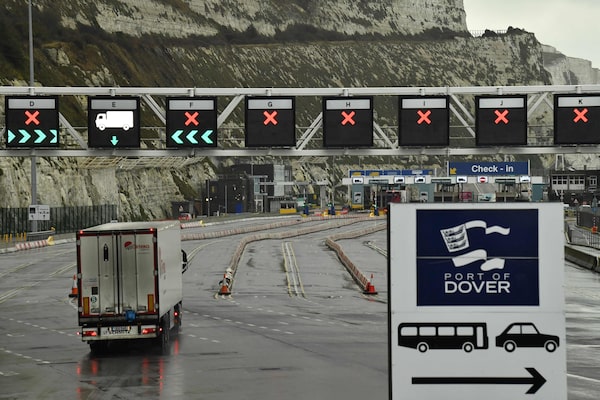
A truck enters the Port of Dover on Jan. 4, 2021, following Britain's departure from the European Union.GLYN KIRK/AFP/Getty Images
Trade between the United Kingdom and the European Union was hammered in the first month of their new post-Brexit relationship, with record falls in British exports and imports of goods as COVID-19 restrictions continued on both sides.
British goods exports to the EU, excluding non-monetary gold and other precious metals, slumped by 40.7 per cent in January compared to December, the U.K. Office for National Statistics said on Friday. Imports fell by 28.8 per cent -- another record.
The ONS said the COVID-19 pandemic, which left Britain under lockdown measures in January, made it hard to quantify the Brexit impact from new customs arrangements, and there were changes in the way data was collected too.
But there were still signs of a Brexit hit.
Trade in chemicals was especially weak, reflecting the winding-down of a rush to stockpile pharmaceuticals ahead of the end of the Brexit transition period, the ONS said.
The ONS highlighted a 64 per cent fall in exports of food and live animals to the EU -- including shellfish and fish.
It pointed to delays caused by red tape reported by the Scottish Seafood Association, with consignment sign-offs reportedly taking six times longer.
“External evidence suggests some of the slower trade for goods in early January, 2021, could be attributable to disruption caused by the end of the transition period,” the ONS said.
Many companies stockpiled goods in late 2020 to avoid any disruption, deepening the fall in trade in January.
The ONS said its separate business survey suggested that trade picked up towards the end of the month.
Britain on Thursday delayed the introduction of a range of post-Brexit import checks on goods from the EU by around six months, saying businesses needed more time to prepare because of the impact of the pandemic.
Prime Minister Boris Johnson says Britain’s new independent trade policy means it can focus on deals with faster-growing economies around the world, although many trade analysts are sceptical that this boost will outweigh lost EU trade.
Britain’s official budget forecaster says the country’s new trade arrangements with the EU, the world’s biggest single market, will erode its long-run productivity by 4 per cent compared with staying in the bloc.
“This month’s unique combination of factors made it inevitable that we would see some unusual figures this January,” said David Frost, a senior minister who was Mr. Johnson’s chief Brexit negotiator.
Economists say the hit to EU trade -- and any benefits from Brexit -- will become clearer.
“While some of the non-tariff barriers to trade, such as the increase in red tape and form-filling, will be ironed out in the short term, the combination of COVID-19 and Brexit will ultimately prove to be a long-term drag on growth,” said Ana Boata, head of macroeconomic research at trade credit insurer Euler Hermes.
Britain’s overall goods trade deficit, including non-EU countries, narrowed to £9.83-billion ($17.06-billion) in January from £14.32-billion ($24.86-billion) in December.
Be smart with your money. Get the latest investing insights delivered right to your inbox three times a week, with the Globe Investor newsletter. Sign up today.